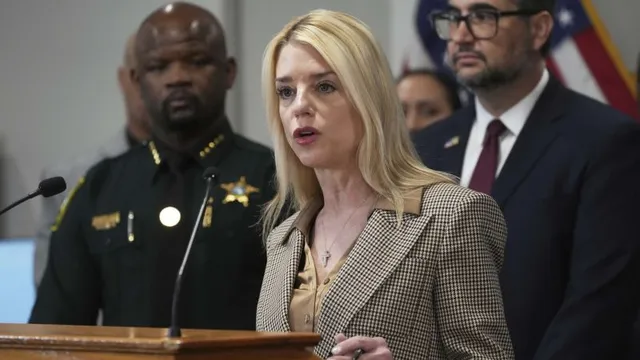
Trump administration reinstates aggressive tactics against journalists' leaks
2025-04-26 01:51- The Justice Department has reinstated regulations allowing the issuance of subpoenas to journalists as part of leak investigations.
- This measure comes after Attorney General Pam Bondi's memo rescinded Biden-era protections for the media.
- The shift indicates a renewed focus on prosecuting government leaks, which may threaten press freedoms.
Express your sentiment!
Insights
In the United States, the Justice Department, led by Attorney General Pam Bondi, has changed its approach to handling journalist protections in leak investigations. This shift comes after the rescission of a policy established during the Biden administration, which prevented federal prosecutors from using subpoenas and other legal tools to access reporters' records and compel their testimony. Bondi's memo emphasized the need for accountability regarding leaks of sensitive information, claiming that unauthorized disclosures undermine effective governance and national security. This reversal is seen as a response to complaints from the Trump administration regarding several high-profile leak scandals that exposed internal decisions and sensitive information. The memo outlined that federal employees leaking information compromises the Department of Justice's (DOJ) ability to uphold the law and protect civil rights. It also announced that members of the press would be obligated to respond to subpoenas issued in investigations into government leaks. Bondi asserted that these actions are necessary to identify and penalize those responsible for improper disclosures. The new regulations indicate a more aggressive stance toward pursuing leaks, which could have significant implications for press freedom in the U.S., as journalists may face increased scrutiny and legal pressure. Furthermore, the memo mentioned that investigations could now involve actions previously limited under the Biden policy, prompting concerns from press freedom advocates. The Reporters Committee for Freedom of the Press expressed worry that the ability to protect confidential sources is crucial for journalistic integrity. Bondi assured that while the DOJ will pursue these actions, there would still be procedural safeguards in place to limit the intrusion on journalists and their sources. This policy change reflects the ongoing tension between government transparency and national security interests, illustrating a broader debate on the freedoms of the press during dark administrative times. With the backdrop of the Trump administration’s historical interactions with media outlets, the return to more stringent investigative tactics suggests a shift toward prioritizing governmental control over maintaining press freedoms. As a result, this move raises alarms among various advocacy groups about the potential chilling effect it may have on journalistic practices and the vital role of journalists in uncovering essential information for the public.
Contexts
The debate surrounding national security versus press freedom is a dynamic and multi-faceted issue that has gained urgency in recent years. In an era characterized by rapid technological advancements and evolving geopolitical threats, the balance between safeguarding a nation’s security interests and upholding the fundamental principles of press freedom has become increasingly contentious. This discussion often centers around the need for transparency and accountability in governance, particularly concerning issues that may affect public safety, while also recognizing the critical role that a free press plays in a democratic society. A robust media environment is essential for informing citizens, enabling civic engagement, and serving as a check on government power. Proponents of national security measures often argue that certain information must remain confidential to protect citizens and national interests. They assert that disclosing sensitive information, especially related to intelligence operations, military strategies, or cybersecurity vulnerabilities, can jeopardize national safety and hinder law enforcement efforts. This perspective frequently calls for the imposition of restrictions on press reporting, especially in times of crisis or conflict, with the intention of preventing the potential exploitation of sensitive information by hostile entities. However, such restrictions can lead to a slippery slope where censorship becomes normalized, undermining the press's ability to investigate, critique, and hold power to account. Conversely, advocates for press freedom contend that limiting access to information in the name of national security can lead to governmental overreach and a lack of transparency. A free and independent press is crucial in exposing corruption, human rights violations, and abuses of power. The media serves as a conduit for public interest, enabling society to understand complex issues and fostering accountability among those in power. Historically, instances of governmental censorship have often been justified by claiming national security concerns; however, these actions can stifle critical discourse and erode public trust in institutions. The challenge lies in ensuring that security measures do not infringe upon civil liberties and the public’s right to know. Finding a balance between these two competing interests requires thoughtful deliberation and a commitment to protecting democratic principles. It necessitates a legal and regulatory framework that allows for both effective national security protocols and the protection of press freedoms. Courts and legislatures often play a critical role in adjudicating conflicts that arise when national security claims are invoked to limit press access or reporting. Additionally, fostering a culture of transparency within government institutions can help mitigate tensions between national security concerns and the right to information. Promoting open dialogue involving policymakers, journalists, and civil society organizations is crucial for navigating these complex issues. By cultivating mutual understanding and respect for both national security imperatives and the essential need for a free press, societies can better safeguard their democratic ideals.